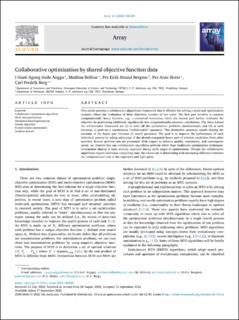| dc.contributor.author | Angga, I Gusti Agung Gede | |
| dc.contributor.author | Bellout, Mathias | |
| dc.contributor.author | Bergmo, Per Eirik Strand | |
| dc.contributor.author | Slotte, Per Arne | |
| dc.contributor.author | Berg, Carl Fredrik | |
| dc.date.accessioned | 2022-11-30T09:49:05Z | |
| dc.date.available | 2022-11-30T09:49:05Z | |
| dc.date.created | 2022-11-07T12:42:34Z | |
| dc.date.issued | 2022 | |
| dc.identifier.citation | Array. 2022, 16 1-16. | en_US |
| dc.identifier.issn | 2590-0056 | |
| dc.identifier.uri | https://hdl.handle.net/11250/3034956 | |
| dc.description.abstract | This article presents a collaborative algorithmic framework that is effective for solving a multi-task optimization scenario where the evaluation of their objectives consists of two parts: The first part involves a common computationally heavy function, e.g., a numerical simulation, while the second part further evaluates the objective by performing additional, significantly less computationally-intensive calculations. The ideas behind the collaborative framework are (i) to solve all the optimization problems simultaneously and (ii) at each iteration, to perform a synchronous “collaborative” operation. This distinctive operation entails sharing the outcome of the heavy part between all search processes. The goal is to improve the performance of each individual process by taking advantage of the already-computed heavy part of solution candidates from other searches. Several problem sets are presented. With respect to solution quality, consistency, and convergence speed, we observe that our collaborative algorithms perform better than traditional optimization techniques. Information sharing is most actively exploited during early stages of optimization. Though the collaborative algorithms require additional computing time, the added cost is diminishing with increasing difference between the computational cost of the expensive and light parts. | en_US |
| dc.language.iso | eng | en_US |
| dc.publisher | Elsevier | en_US |
| dc.rights | Navngivelse 4.0 Internasjonal | * |
| dc.rights.uri | http://creativecommons.org/licenses/by/4.0/deed.no | * |
| dc.subject | Gradient descent | en_US |
| dc.subject | Particle swarm optimization | en_US |
| dc.subject | Genetic algorithm | en_US |
| dc.subject | Simulation-based optimization | en_US |
| dc.subject | Multi-task optimization | en_US |
| dc.subject | Collaborative optimization algorithms | en_US |
| dc.title | Collaborative optimization by shared objective function data | en_US |
| dc.title.alternative | Collaborative optimization by shared objective function data | en_US |
| dc.type | Peer reviewed | en_US |
| dc.type | Journal article | en_US |
| dc.description.version | publishedVersion | en_US |
| dc.rights.holder | © 2022 The Author(s). Published by Elsevier Inc. | en_US |
| dc.source.pagenumber | 1-16 | en_US |
| dc.source.volume | 16 | en_US |
| dc.source.journal | Array | en_US |
| dc.identifier.doi | 10.1016/j.array.2022.100249 | |
| dc.identifier.cristin | 2069938 | |
| dc.relation.project | Norges forskningsråd: 296207 | en_US |
| cristin.ispublished | true | |
| cristin.fulltext | original | |
| cristin.qualitycode | 1 | |

